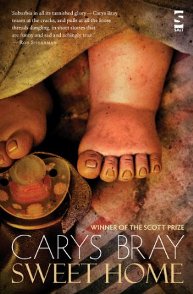To the casual reader, Sweet Home (winner of Salt Publishing's Scott Prize) may seem to be a collection of stories about the highs and lows of parenthood. And they would be right. But it's also much more. There are lessons here, reminders not to judge a person until you've stepped into their shoes, because everyone has their own private battle with life and love and loss.
She observes the changes in his vital signs: the wretchedness before the visits; the flatlining afterwards, and she is ready with defibrillating cups of tea on his return. The Rescue
Indeed loss, in all its guises, is the driving force of many of Bray's characters. It is grief that drives the woman in 'Just in Case' to steal, but in 'The Rescue' it is the metaphorical loss of one's child that forces the parent to act. And in 'Under Covers', with its marriage of sorrow and humour - He commented on their sexual relations like a football pundit until she told him not to - his Yorkshire accent stopped her from pretending that he was a sheik of an imaginary country in the Far East or an Italian Count - and he had to be content instead with a post-match report, smoothing his moustache and reviewing his selected highlights. - it is the loss of a sense of identity and later, of a husband, that haunt both the protagonist and the reader.
According to the author bio, Bray is a mother of four (I won't dare to ponder how she manages to raise four children and write such remarkable fiction) so... she knows. I'm not saying she has experienced everything in this book, but she has four children, so she knows. She knows unconditional love, frustration, anger, sadness... the push and pull that comes with the need to let a child go.
She always looks pleased because Letty has cut a gory, biro smile into her round, peg face. Wooden Mum
But these stories aren't limited to a mother's perspective. Neither are they only about being a parent. These are grandparents, husbands, sisters, widows, sons and strangers. And they are not all mainstream as Bray tips her hat to the fantastic and the futuristic. 'The Ice Baby' is a sci-fi story of loss and desperation, while 'The Baby Aisle' takes us to a place where infants can be purchased (sometimes, in the case of twins, as a BOGOF offer) from the local supermarket. And the title story, 'Sweet Home', is a reworking of Hansel and Gretel, set in a frighteningly racist/ageist suburbia. All, of course, perfectly injected with the author's laconic humour.
"Inside the suitcase was a baby skeleton. That's what the woman said. A baby skeleton. As if it might grow into an adolescent skeleton and then an adult skeleton." Just in Case
But it is Bray's use of observational wit that makes these stories transcend genre and subject. It is a writer's great skill to make their personal world resound with others and Bray does this effortlessly. The writer/musician/artist is there to remind us of the things we take for granted, to add a new perspective to our everyday encounters and to make the mundane colourful and exciting, something that Bray excels at.
"What she would like most of all is to stay at home with Mummy. Forever. But Mummy doesn't like it when she says that. Anna knows this because Mummy's face goes hard, and she says that there is plenty of time to decide; girls can do as well as boys and must do whatever they want in life. Doing whatever she wants to does not seem to include staying at home with Mummy, although it might include being a chef, but Anna isn't sure." On the Way Home
Most of these tales are in the first person, but there are some written in the third. And others that read as an open letter. Some are past tense - ghosts that haunt, whilst others are in the present and very much alive. They are the fantasies played out over and over. The gripping fear of the father-to-be, the frustrations of the regretful mother 'She would like to censor any shameful language: 'You stupid boy', 'I can't take you anywhere', 'I should have thought twice about having children'. She does this in her director's Cut. In this version she is always smiling. (Dancing in the Kitchen)
My favourite in the collection is a story told through the eyes of a boy. In 'Scaling Never' Bray manages to convey the boy's desperate need to understand that his sister will never be coming back. Bray seems able to tap into the emotional well of childhood fear and curiosity to give us a story that genuinely seems to have come from the mind of a child.
He practised it until it stopped sounding like a sticky eye infection - mengy-eye-tus, and started to sound more like men-ingiantis; a band of giants who had magicked Issy into the Celestial Kingdom.
This is not a collection of sad stories. These characters are bold. They're fighters, fictional characters who can teach us about what matters in life, and that people can, and do, cope with whatever is thrown at them.
I hear on the grapevine (facebook!) that the author is writing a novel. She's got her work cut out if she's going to come up with something as remarkable as Sweet Home, but if the novel is half as good as her shorter fiction, Bray will prove herself a writing force to be reckoned with. I can't wait!




